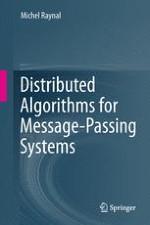2013 | OriginalPaper | Chapter
6. Nature of Distributed Computations and the Concept of a Global State
Author : Michel Raynal
Published in: Distributed Algorithms for Message-Passing Systems
Publisher: Springer Berlin Heidelberg
Activate our intelligent search to find suitable subject content or patents.
Select sections of text to find matching patents with Artificial Intelligence. powered by
Select sections of text to find additional relevant content using AI-assisted search. powered by
